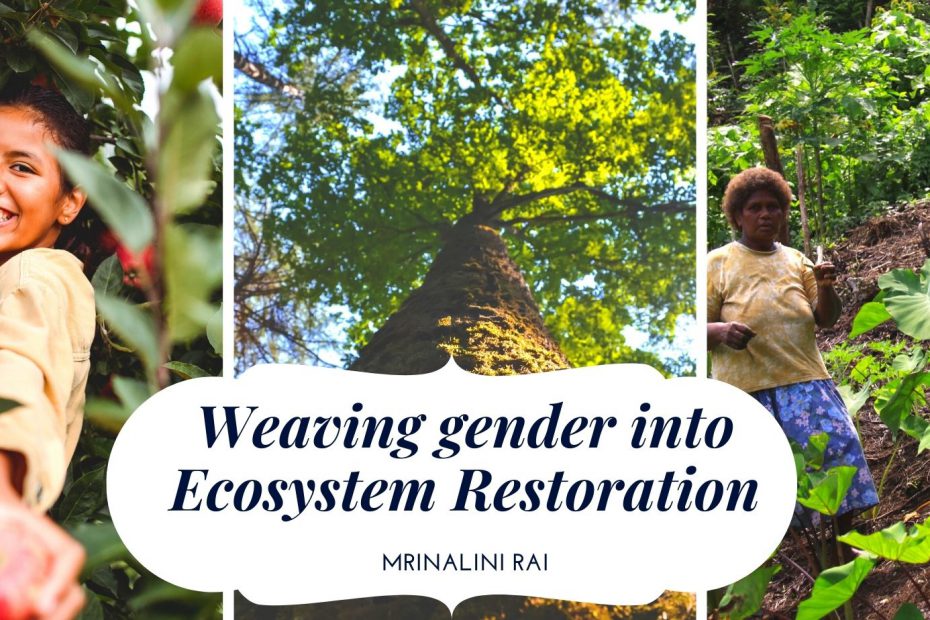Biodiversity underpins the ecosystems and their services and functions are vital to life. As international and national campaigns to restore degraded landscapes are gaining popularity to address the UN Decade on Restoration, there is a gap that persists at the heart of the ecosystem restoration agenda: the missed attention to the socio-cultural dimensions besides just the biophysical aspect of ecosystems. As such, the gender dimension is largely missed and creates further power imbalances within communities and commonly overlooked in restoration initiatives. This further exacerbates existing inequalities and creates exclusion by design, mostly for vulnerable communities who most depend on the lands being restored. Further, as usual gender gaps are pervasive and undermine restoration goals, while gender-responsive actions can deliver results and can tackle not only biodiversity conservation, but also poverty and inequality.
Human rights and a healthy planet are mutually dependent. To have a safe, clean and healthy environment, we have to respect, protect and fulfil human rights. To realise our human rights, we must heal, protect and sustainably live on our planet.
While the human rights implications of environmental damage are felt by individuals and communities around the world, the consequences are felt most acutely by those segments of the population that are already in vulnerable situations, including indigenous peoples and local communities, small scale farmers and fisherfolks and majority of whom are women and children.
The needs, aspirations, knowledges and capacities of women are still undervalued or ignored. Meanwhile access, control and benefits remain widely inequitable though impacts of biodiversity loss, climate change and desertification affect those who are already vulnerable, of which women make half of it, if not more. Their response to these disasters and others, including pandemics are restrictive due to the lack of adequate policies or provisions that lack gender response. Role and responsibilities of women and men and other fractions of society are differentiated, and so are strategies and solutions. Further, legal frameworks including customary norms – entrench gender inequalities.
There needs to be a response to the UN Secretary General’s Call to Action for Human Rights the time is now to bring attention back to the people, men and women, boys and girls and their right to a healthy environment.
Principles and obligations derived from international human rights instruments should guide the legislation and policy processes as well as the programming in all sectors and in all phases of the programming process, including the development of Convention on Biological Diversity (CBD) post-2020 global biodiversity framework which is to be adopted in October 2021, in Kunming, China.
From 4-5 June 2021, there see the Virtual Launch Gala welcoming the UN Decade on Ecosystem Restoration and the time is now, more than ever for a need to place people and societal equity squarely at the center of the restoration discourse to ensure a gender-just policy framework for biodiversity governance.
Prioritizing women’s political and social empowerment and leadership, particularly for those who experience intersecting forms of discrimination (of race, class, sexuality, gender, ethnicity, location, etc.) that prevent their participation on equal terms is needed. From the perspective of women and those facing multiple oppressions, having safe space, equitable treatment and the recognition of fundamental rights and freedoms including right to access to and ownership to land and resources and benefit sharing is essential to a just transition to a greener economy and ensuring that half the world’s populations are part of the solution.
In the face of global risks, rapid, evidence-based, participatory and collective action not only produces the best results, it is also fulfilling human rights obligations. Effective responses to COVID-19 and environmental crises should be global responses grounded in solidarity, compassion, respect for human dignity and ecological integrity.
Gender equality and women’s empowerment are fundamental to human rights and social justice which has also been recognised as one of the essential principles for a biodiversity- inclusive approach to One Health approach of CBD. Women should not be seen as vulnerable but should be regarded as key partners and as agents of change.
Women matter – and they are part of the solution!

